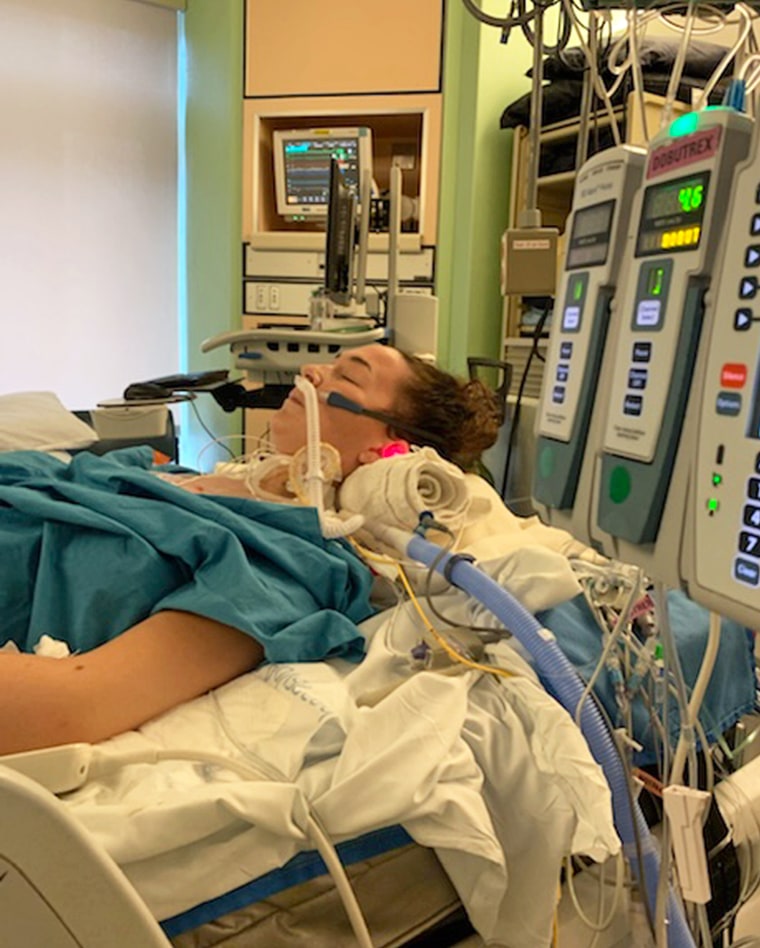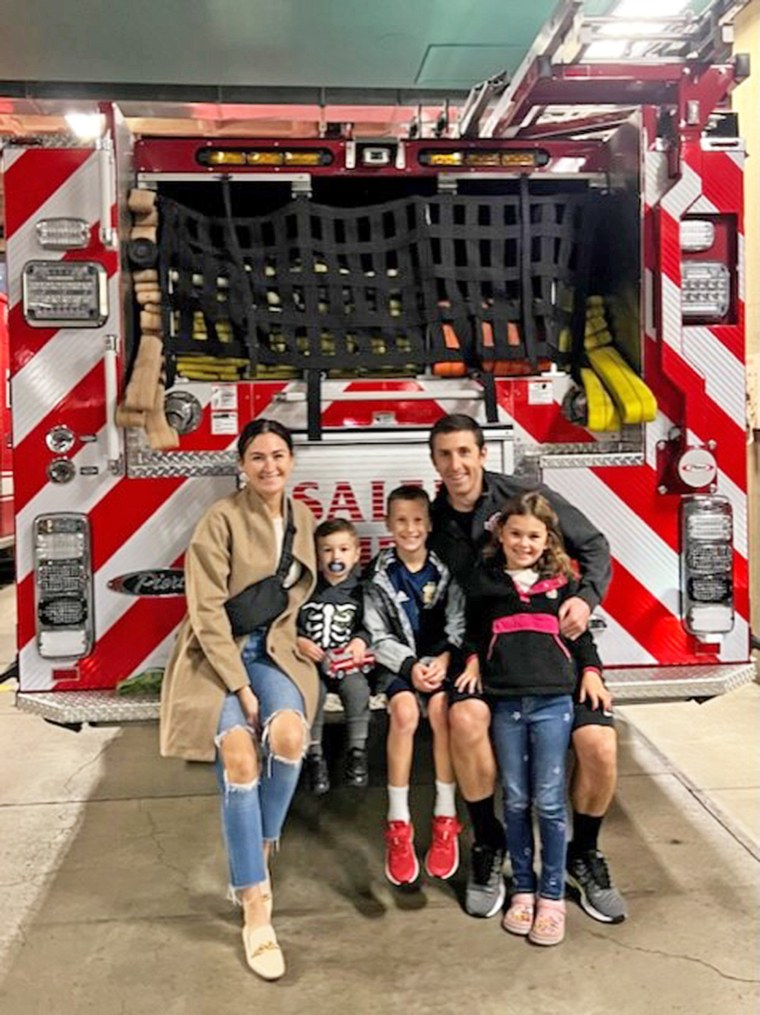In November 2021, Hillary Steffen lost her sense of taste and smell and thought she had COVID-19. While she also had a low-grade fever that started a few days earlier, it didn’t feel “alarming,” she says. But then she experienced something unusual.
“I woke up and my arms were tingling and numb and it went into my fingers,” the 36-year-old from Turner, Oregon, tells TODAY.com. “I felt nauseous and an overall discomfort.”
The mom of three experienced several episodes like this, until “I began vomiting one evening and continued to have that tingling and numbness,” she says. “That’s what really told us I needed to get to the hospital.”

At the hospital, she learned she had congestive heart failure from cardiomyopathy, when the heart struggles to pump blood, likely caused by COVID-19.
“The moment the cardiologist was at my bedside and said I had heart failure, I turned to my husband, and he looked so shocked,” she says. “I was just really confused and also trying to survive.”
Mild COVID led to heart infection
Steffen’s two older children had a low-grade fever a week before she developed one. While they recovered in about 24 hours, her fever lingered. But she also was breastfeeding her 7-month-old at the time and had mastitis, an inflammation in the breast tissue, which she knew could cause symptoms similar to what she was feeling. Then she lost her sense of taste and smell.
“I assumed it was probably COVID,” she says.
When the tingling and numbness began, she still didn’t feel worried. But when she tried to eat and began vomiting, Steffen knew something was wrong. Her husband is a firefighter and paramedic, and he gave her IV fluids, yet she didn’t improve. So, about a day and a half after the tingling started, they went to the hospital in Salem, Oregon.
“They were also pretty confused as to what was going on because I was a healthy 33-year-old. I don’t have any medical conditions. I am not on any medications,” Steffen recalls. “They did test me for COVID and saw I was positive, but the symptoms were not respiratory. So that made it even more confusing.”
Doctors treated her for dehydration. She started slipping in and out of consciousness and her blood pressure plummeted. When they gave her medication to increase her blood pressure, “everything started to get worse," she says.
“I began swelling up in my chest and ... the veins in my neck are popping out, and they rolled in the code cart, thinking I was going into cardiac arrest,” Steffen continues.
Doctors sent her to intensive care unit and conducted an echocardiogram. They learned her ejection fraction — a measure of how effectively the heart pumps, according to the American Heart Association — was less than 10% — a sign she was in heart failure. A normal ejection fraction is between 55% and 70%.
Doctors knew she needed both sides of her heart to undergo catheterization, but when they started the procedure, they found the fluid Steffen received had collected in her chest.
“They put a needle in my chest and drained off 250 milliliters of fluid and thought that maybe that would relieve my heart, but it didn’t,” she says. “I was still super super sick.”
At that point, her care team realized she needed an Impella heart pump and placed one in her femoral artery in her leg. The pump helped her heart function better, But it was too soon to know if it could save her from more serious interventions.
“The goal was for my heart to hopefully recover, but if it didn’t recover, I was going to need a heart transplant,” she says. “I also remember looking at my sister and just thinking I was not going to make it and asking her to take care of my babies.”

Doctors transferred her to another hospital that could provide her with specialized heart care.
COVID and myocarditis
While doctors don’t “fully understand” why COVID-19 can cause myocarditis, they know there’s a relationship between infection and the heart, Dr. Jacob Abraham, a cardiologist with the Providence Heart Institute and division chief of advanced heart failure, in Portland, Oregon, tells TODAY.com.
“We know that viral infections of the body can involve the heart, and there’s a spectrum of severity from mild to severe,” Abraham explains. “There’s theories as to whether it’s direct viral infection or whether it’s an immune response that indirectly begins to involve ... the heart.”
While this sounds worrisome, Abraham notes that it’s “rare.”
Abraham was one of the doctors who treated Steffen after she was transferred. Soon after she arrived, they understood how sick she was. Giving her a heart pump early on benefited Steffen.
“I definitely think that, given her severe critically illness that she was experiencing, had she not been supported with a mechanical heart pump, she probably would not have survived,” he says. “We knew given the profound level of heart dysfunction that she was going to need support for longer than a few days.”
They placed a more powerful Impella pump into her arm to help her as they treated her.
In viral myocarditis, infection and inflammation weaken the heart muscle, Abraham says. For Steffen, it caused acute heart failure.
“Heart failure can be acute where somebody has presumably a normal heart and then it becomes over a short period of time impaired, either because of viral infection or a heart attack,” Abraham says. “That can evolve into chronic heart failure, where patients have impaired heart muscle function."
Symptoms of heart failure in women can include:
- Nausea
- Tingling
- Lightheadedness
Patients and providers need to be mindful that these symptoms can be a sign of heart failure, Abraham says. “The moral of the story is that if they aren’t getting better or they’re progressing rapidly, we have to think about involvement of the heart very early on.”

Last year, Abraham conducted an MRI of Steffen’s heart to look for scarring or permanent damage and found there were no signs of lingering problems. He doesn't think she'll need long-term heart monitoring and that it will be enough for her to see her primary care doctor regularly and a cardiologist on occasion.
Life after heart failure
After 20 days in the hospital, Steffen returned home. She took medication and participated in cardiac rehabilitation for eight weeks.
“That gave me the confidence to feel like, ‘OK I can exercise on my own again,’” she says.
She didn’t start off doing any heavy lifting. Instead, she slowly built up her endurance. More than two years after her bout with heart failure, Steffen feels better than ever.
“I am definitely stronger today than I was prior to this happening,” she says. “I do exercise … and do resistance training with a little bit of cardio.”
Recovering emotionally felt tough. Her youngest was 7 months old, and she was breastfeeding when she became ill and had to stop suddenly.
“He didn’t remember me,” she says. “That was really challenging, but again a lot of it was more emotional, and it just took some time to recover and begin processing and really breaking down what had actually gone on.”
She's no longer taking medication, and she enjoys mothering her children now, 9, 7 and 2. Steffen started a podcast, “Heart to Heart,” and advocates about heart failure.
“I have hope and feel like I have purpose,” she says. “It is important to spread awareness on something that, although it is rare, does still happen every day.”